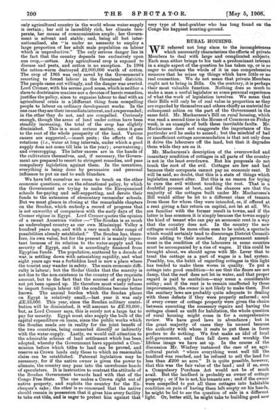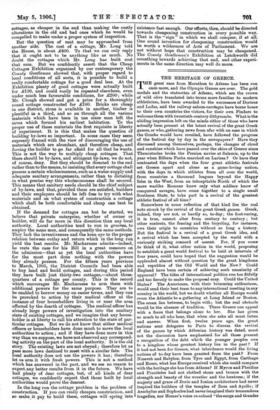RURAL HOUSING.
WE referred not long since to the incompleteness which necessarily characterises the efforts of private Members to deal with large and complicated subjects. Each man either brings to his task a predominant interest in a single aspect of the question he has taken up, or is so eager to embrace the whole of it in one comprehensive measure that he mixes up things which have little or no real connection. We do not mean that private Members ought not to bring in Bills. On the contrary, it is perhaps their most valuable function. Nothing does so much to make a man a useful legislator as some personal experience of what the work of legislation involves. We mean that their Bills will only be of real value in proportion as they are regarded by themselves and others chiefly as material for subsequent action on the part of the Government in the same field. Mr. Mackarness's Bill on rural housing, which was read a second time in the House of Commons on Friday week, is an example of both these inevitable faults. Mr. Mackaruess does not exaggerate the importance of the particular evil he seeks to amend; but the mischief of bad or insufficient cottage accommodation is that not only does it drive the labourers off the laud, but that it degrades them while they are on it.
Mr. Mackarness's description of the overcrowded and insanitary condition of cottages in all parts of the country is not in the least overdrawn. But his proposals do not touch the root of the evil. Cottages are few and bad because their occupants cannot pay an economic rent. It will be said, no doubt, that this is a state of things which legislation cannot alter. But this is no reason for trying to cure the evil without touching the root. That is a doubtful process at best, and the chances are that the majority of the cottages built under Mr. Mackarness's Bill would either be let to a different class of tenants from those for whom they were intended, or, if offered at a rent giving a fair return on capital, not let at all. We are familiar with the former result in towns, and if the latter is less common it is simply because the towns supply the kind of tenant who can pay an economic rent in a way that the country does not. In the country the new cottages would be more often seen to be unlet, a spectacle which would certainly tend to discourage District Councils from adding to their number. Any permanent amend- ment in the condition of the labourers in some counties must be accompanied by a rise of wages. If this could be brought about, we should agree with Mr. Lever that to treat the cottage as a part of wages is a bad system. Possibly, too, the habit of regarding cottages in this light has tended to make them worse in quality. To put a cottage into good condition—to see that the floors are not damp, that the roof does not let in water, and that proper regard is paid to sanitation—may mean a considerable outlay ; and if the rent is to remain unaffected by these improvements, the owner is not likely to make them. But the sanitary laws are probably quite adequate to dealing with these defects if they were properly enforced; and if every owner of cottage property were given the choice between executing the necessary repairs and having the cottages closed as unfit for habitation, the whole question of rural housing might come in for a comprehensive review. We have good laws in abundance ; but in the great majority of cases they lie unused because the authority with whom it rests to put them in force prefers to do nothing. We first make an idol of local self-government, and then fall down and worship the lifeless image we have set up. In the course of the discussion Mr. Winfrey instanced the case of an agri- cultural parish "where everything went well till the landlord was reached, and he refused to sell the land for. less than £200 an acre." It is quite possible, however, that this was the fair value of the land ; and if so, even a Compulsory Purchase Act would not be of much avail. But the landlord is probably an owner of cottage property ; or if he is not, his tenants are ; and if the owner were compelled to put all these cottages into habitable condition on pain of having them left empty on his hands, he might be led to see the question of sale in a different light. Or, better still, he might take to building good new cottages, as cheaper in the end than making the costly alterations in the old and bad ones which he would be compelled to make under a proper system of inspection.
But the question of rent may be approached from another side. The cost of a cottage, Mr. Long told the House, is about £400. To that we can only reply that it ought not to be anything like as much. No doubt the cottages which Mr. Long has built cost that sum. But we confidently assert that the Cheap Cottages Exhibition organised by our contemporary the County Gentleman showed that, with proper regard to local conditions of all sorts, it is possible to build a really comfortable cottage for a good deal less. At the Exhibition plenty of good cottages were actually built for £150, and could easily be repeated elsewhere, even under much less favourable conditions, for £200; while Mr. Clough showed and got a prize for a thoroughly sound cottage constructed for £100. Bricks are cheap in one district, stone is available in another, timber is plentiful in a third, and so on through all the various materials which have been in use since man left the caves which formed his earliest habitation. To the proper use of these materials the first requisite is liberty of experiment. It is this that makes the question of building by-laws so important. In some cases they seem expressly framed with the view of discouraging the use of materials which are abundant, and therefore cheap, and forcing the builder to go far afield for all that he wants. This is not the way to multiply cheap cottages. That there should be by-laws, and stringent by-laws, we do not, of course, deny. But they should be directed to the end rather than to the means, to insisting that every cottage shall possess a certain wholesomeness, such as a water-supply and adequate sanitary arrangements, rather than to dictating in what precise way this wholesomeness shall be secured. This means that sanitary needs should be the chief subject of by-laws, and that, provided these are satisfied, builders and their employers should be left free to try with what materials and on what system of construction a cottage which shall be both comfortable and cheap can best be obtained.
If the demand for cottages can but be started, we believe that private enterprise, whether of owner or builder, will do far more in this direction than any local authority. Local authorities tend to run in grooves, to employ the same men, and consequently the same methods. They lack the inventiveness and the keen eye to the proper relation between outlay and return which in the long run yield the best results. Mr. Mackarness admits—indeed, he rests the case for his Bill in a great measure on the admission—that as yet the local authorities have for the most part done nothing with the powers they already possess. For the fifteen years previous to March, 1905, the District Councils had been able to buy land and build cottages, and during this period they, have built just thirty-two cottages,—about three- quarters of a cottage per county. This is the record which encourages Mr. Mackarness to arm them with additional powers for the same purpose. They are to be enabled to borrow money on easier terms, and they can be provoked to action by their medical officer at the instance of four householders living in or near the area affected by the dearth of cottages. The medical officer has already large powers of investigation into the sanitary state of existing cottages, and we imagine that any house- holder is at liberty to call his attention to the state of par- ticular cottages. But we do not know that either medical officers or householders have done much to move the local authorities to action ; and if they have done more in this way than we suppose, we have not observed any correspond- ing activity on the part of the local authority. It is the old story. The existing laws are not obeyed ; therefore let us pass more laws destined to meet with a similar fate. The local authority does not use the powers it has ; therefore let us arm it with fresh powers. This is not a method which has answered in the past, and we see no reason to expect any better results from it in the future. We have had plenty of dear cottages, but, of all kinds of dear cottages, we confidently expect that those built by local authorities would prove the dearest.
In the long run the cottage problem is the problem of construction. If you can really cheapen construction, and so make, it pay to build them, cottages will spring into existence fast enough. Our efforts, then, should be directed towards cheapening construction in every possible way. That is the " sign " in which we shall conquer, if at all. One sound invention for cheapening construction would be worth a wilderness of Acts of Parliament. We are not without hope that construction may be cheapened. The County Gentleman's Exhibition at Letchworth did something towards achieving that end, and other experi- ments in the same direction may well do more.









































 Previous page
Previous page